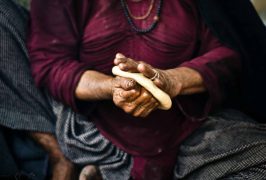This case concerns the over-incarceration of Indigenous women.
LEAF, in partnership with the David Asper Centre for Constitutional Rights (the Asper Centre), intervened before the Ontario Court of Appeal.
LEAF also intervened before the Supreme Court of Canada.
Facts
Cheyenne Sharma is a young Indigenous woman, an intergenerational residential school survivor, and a single mother. Facing financial hardship and the potential of eviction for her and her two-year-old daughter, Ms. Sharma acted as a drug courier and imported 2 kg of cocaine into Canada. She was convicted of importing drugs.
As an Indigenous person, Ms. Sharma is entitled to the use of the Gladue framework in her sentencing. This individualized and contextualized framework requires judges to consider alternatives to incarceration when sentencing Indigenous offenders. One such alternative is a conditional sentence, a community-based alternative to a custodial sentence. However, because Ms. Sharma was convicted of importing drugs, an offence with a maximum sentence of 14 years, she was not eligible for a conditional sentence.
The sentencing judge acknowledged that, prior to the 2012 enactment of Criminal Code provisions restricting the availability of conditional sentences, Ms. Sharma would have been eligible for, and would have received, a conditional sentence. He did not accept, however, that the provisions barring him from imposing such a sentence infringed either Ms. Sharma’s ss. 7 or 15 Charter rights.
Arguments
Before the Ontario Court of Appeal, LEAF and the Asper Centre highlighted how systems of discrimination based on gender, race, socio-economic status, and colonialism shape the experiences of criminalized Indigenous women in the Canadian criminal justice system. By magnifying the very injustices that the Gladue framework is intended to redress, the Criminal Code provisions violate the constitutional imperative of substantive equality guaranteed by s. 15 of the Charter.
By barring Indigenous people from accessing conditional sentences as an alternative to custodial sentences, the Criminal Code provisions deny Indigenous offenders the full benefit of the Gladue framework. This worsens the discrimination faced by Indigenous people in the administration of criminal justice. It has a particularly damaging impact on Indigenous women, who face systematic disadvantage at all points along the victimization-criminalization continuum. The victimization-criminalization continuum is a feminist concept that understands women’s experiences of criminalization and victimization as inextricably linked and mutually reinforcing.
At the Supreme Court of Canada, LEAF argued that the Court needed to take a substantive equality approach when considered if the provisions were constitutional or not. LEAF also argued that the Court should affirm the imperative of reconciliation between Indigenous and non-Indigenous Canadians in all areas.
Outcome
The Ontario Court of Appeal’s majority decision found that the provisions were unconstitutional. A majority of the Supreme Court of Canada, however, disagreed. The majority found that Ms. Sharma’s s. 15 rights had not been violated, and upheld the provisions as constitutional.
Shortly after the decision, the federal government passed Bill C-5, An Act to amend the Criminal Code and the Controlled Drugs and Substances Act. Bill C-5 repealed the provisions that were at issue in this case. As a result, conditional sentences became an available option for trial judges to consider in sentencing Indigenous offenders for a broader variety of offences, provided other requirements were also met (including that the sentence is less than two years, and serving the sentence in the community will not endanger the community).
LEAF is grateful to Jessica Orkin and Adriel Weaver, counsel in this case before the Ontario Court of Appeal, and to Alisa Lombard and Aubrey Charette, counsel in this case before the Supreme Court of Canada.
LEAF’s interventions are all guided, informed and supported by a case committee composed of academics and practitioners with expertise in the relevant issues. LEAF gratefully acknowledges their contributions to the arguments in this factum.
The case committee members for LEAF’s intervention before the Ontario Court of Appeal were Gillian Balfour, Emma Cunliffe, Mary Eberts, Emily Hill, Naiomi Metallic, Renée Pelletier, Rakhi Ruparelia, Martha Shaffer, and Kim Stanton.
The case committee members for LEAF’s intervention before the Supreme Court of Canada were Gillian Balfour, Maria Dugas, Mary Eberts, Koren Lightning-Earle, Naiomi Metallic, and Maggie Wente.
Download LEAF and the Asper Centre’s factum here.
Download LEAF’s Supreme Court of Canada factum here.
Read the Ontario Court of Appeal’s decision here.
Read the Supreme Court of Canada’s decision here.
